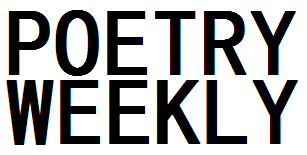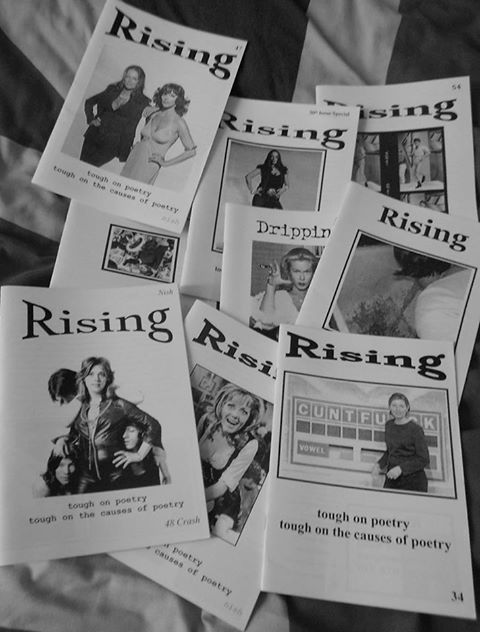Rising #58 and Poetry Weekly #1
-Reviewed by Jennifer Edgecombe–
Poetry Weekly and Rising are two A5 poetry magazines. They look very similar with respect to form and content, but soon begin to differ. Cult magazine Rising is on issue 58 having been first published in 1993 whereas Poetry Weekly launched its first issue in April 2013. Poetry Weekly is, as its name suggests, published weekly while Rising is handed out at gigs by Tim Wells on a looser timetable. Poetry Weekly retails for £1 an issue whereas Rising is free. There is a very sparse website available for Poetry Weekly – white, stark – it mimics the manifesto, style and theme of the magazine., whereas Rising has no web presence. These magazines are exciting, they’re mysterious, they’re niche, (or ‘Nish’ as it is written on the cover of Rising) but it makes me wonder, who on earth reads them?
This question is particularly relevant for Poetry Weekly, whose introductory page written by Paul McMenemy preaches that new poets need to ‘increase their readership’, and that the poets themselves need to read as much poetry as possible in order to learn how to write new poetry and be publishable. Defining cost as the red light in the way of this traffic, Poetry Weekly‘s manifesto is just that; to produce a cheap and accessible magazine in order for these seemingly new or previously unpublished poets to get printed and digested by others.

Poetry Weekly contains work from 8 emerging poets. They appear to be relatively unknown as the names are not as familiar as those in Rising and the magazine doesn’t contain biographies. The subsequent issues bulk up the poet count, contain a variety of themes and perhaps a variety of quality too. From issue 1, I would particularly like to read more poems from Stephen Waclawski and see how his work develops. In his poem ‘The Way Home’, he demonstrates a particular adeptness at twisting images on their heads, see for instance the way the nodding muzzle takes the place of the nodding below:
‘The muzzles of three dogs nod past the camera,
each body curved into its own slipstream.’
And similarly again:
‘A breeze draws in a forbidden smoke. He inhales
one breath the length of that last hundred metres.’
His language in ‘News at Ten’ is also engaging and fun to read. This is the first verse which is great to read aloud:
‘No muffled suits to slip in
and soften with blusher and foundation.
Tattered cheek smoothed back,
hair rearranged to lessen scalp’s burst balloon.
Still expect a flinch but camera’s unmoving,
not even a tremor to hide blink
or twitch from the mouldered face.’
Rising contains poetry from some better-known poets, Helen Mort, Phill Jupitus and Sabotage Reviews’ own Claire Trévien to name a few. The issue is cheeky, tongue in cheek, stating that Rising is ‘tough on poetry / tough on the causes of poetry’ and feature poems on ridiculous dates, reasons for dumping people and ‘Bonkers’ politics. The poems have a purpose and a stride, but that’s not to say that Poetry Weekly lacks in energy with its bold type and in your face agenda, one of the first words you see on the front page is the title of a poem called ‘Argument’; the design reflects the editorial decision to publish poetry cheaply and yet still in great quantity.
What I like about both issues is this fierce spirit to keep poetry alive. But the question remains. Just who are the readers? Outside of London, which gigs is Rising circulated at and in which bookshops will you find Poetry Weekly? Well the answers are, ‘it’s hard to say’ and probably not many. But people with niche interests, seek out the niche. As long as items and ideas like Poetry Weekly and Rising exist there will be pocket hives of poets, both new and established, waiting to submit and eager to contribute without the price tag. Does this all sound a bit ‘Free Love’? Well purchase the first issue of Poetry Weekly and a great visual poem will tell you that it’s ‘Not Free’ and it’s ‘Not Love’. But my slight preference would be to (somehow) get hold of more copies of Rising. For me, the work is overall slightly better. In particular, Rowena Knight’s poem, on which I will end this review, really stands out. In the first half of ‘The Customer Is Always Right’, the reader is cleverly seduced by what is made to appear as a welcoming coffee shop, the ‘cocoon of burgundy walls’ and armchairs draw you in as you carry ‘a castle of paper shopping bags’. You are treated like royalty, even your spillage is the barista’s fault. Whilst the poem-character happily sips their coffee, the reader is exposed to how the manager’s relentlessness to create the harmonious vision of the coffee shop is at the barista’s expense, her health, her low pay, her hard work:
‘He chucked the last five. Remember
the regular’s names, their preferences for foam.
Ask about their holidays.
She blows her nose. Shivers.
Wishes for a heater.
All the staff are ill; the sick pay’s a joke.
She gives herself an extra two minutes.
Prays the manager won’t notice.’
Ed. We have just found out that Poetry Weekly has now ceased to publish after ten issues, but the adventure is not yet over, go here for more details…





Pingback: Sabotage review | Poetry Monthly
I prefer Rising, more wake up than your average stay asleep poetry mag.
Pingback: Saboteur Awards 2014: The Shortlist! | Sabotage